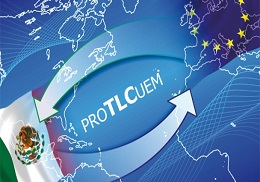
Mexico has reacted to Donald Trump’s offensive with intentions of building a border wall between the two countries and the negotiations to power the new Free Trade Agreement between Mexico and the European Union have been accelerated. Do you want to know more about it?
3 february 2017
While relationships between the United States and Mexico are stressed after the recently-inaugurated presidency of Donald Trump, the European Union and Mexico are moving forward in negotiations to improve the first free trade agreement between the American continent and Europe. Free Trade Agreement (FTA EU-MX), effective from July 2000, an agreement in which Mexico invest its hopes in reducing the high commercial dependency of the United Stated, at around 80%.
It is one of the measure Mexico hopes to undertake with more or less urgency, that is why there is already a date to the two next rounds of negotiations: from 3 to 7 April in Brussels and from 26 to 29 June in México.
Trump forces Mexico to accelerate the negotiation of the new Free Trade Agreement with the EU to depend commercially on the United States in almost 80%
The aim is to conclude the trade moderation process earlier this year, according one Mexican government release which shows positive numbers in reference to commercial relationships between Mexico and the EU since the FTA EU-MX was signed in 2000. The trade between Mexico and EU tripled between 1999 and 2015 when it turned from 18.5 billion dollars to 62 billion dollars.
The materialisation of the agreement was interpreted in the reduction or removal of tariff rates that EU and Mexico applied to importations of goods. That means both Mexico and EU enjoyed several comparative advantages due to other third countries did have to pay the tariff rates of these goods.
With the new agreement which presumably will be closed this year Europe also hopes to obtain benefits because it is being considered the reduction of tariff rates and that new product remain exempt.
Liberalised products
-
Industrial goods: All products have preferential access in the two trades.
-
Agricultural goods: 62% of agricultural trade between EU and Mexico has been completely liberalised. There are products such as wine, alcoholic beverage and olive oil for EU exportations. Mexico obtained the removal of traffic rated in the exportations such as fruits and tropical vegetable, among others.
-
Services: The agreement considers all the services. Among them, financial, telecommunications, distribution, energy, tourism and environmental services. The only exceptions are audiovisual services, maritime cabotage and air services.
Not liberalised products
-
Mexican agricultural exportations to EU: living animals (cow), meat (bovine, pigs and hams), dairy products (such as milk, cream, butter, cheese and eggs), honey, flowers, vegetables (asparagus, sweetcorn, potatoes, potatoes, frozen peas, olive, mushrooms, grapes, apples, pears, strawberries and bananas) cereals (wheat, rye, oats, rice, sorghum, buckwheat and starch), olive oil, meat sausage, sugar, ham and certain fruit juice.
-
European agricultural exportations to Mexico: living animals (bovine, birds, ovine), meat, dairy products (milk, cream, butter, cheese), eggs, potatoes, beans, bananas, apples, coffee, cereals (wheat, rye, oats, corn, rice and sorghum, flour, malt and starch), animal fats, palm , sunflower and coconut oil, cold meats, cold meats, preserved meat, sugar and derivatives thereof, canned tuna, cocoa, cereal preparations, biscuits, canned tomatoes, potatoes , peaches, ham, grape juice, rum, food preparations for fish and cigars.
-
Outstanding services on the part of: air services such as construction, environment (water, drainage system and decontamination), insurance, energy and transport.









